鲁教版(五四制)九年级全册Unit 8 We're trying to save the earth! Section A 3a~4c课件(共28张PPT)
文档属性
| 名称 | 鲁教版(五四制)九年级全册Unit 8 We're trying to save the earth! Section A 3a~4c课件(共28张PPT) |
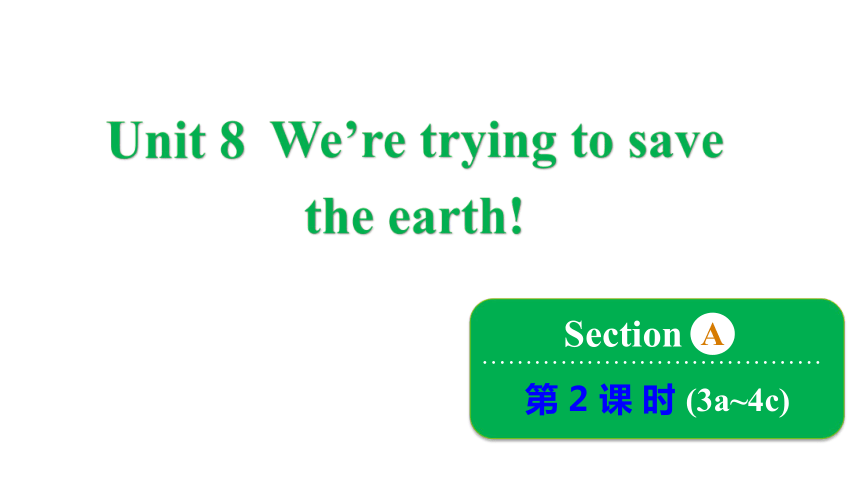
|
|
| 格式 | pptx | ||
| 文件大小 | 817.7KB | ||
| 资源类型 | 教案 | ||
| 版本资源 | 鲁教版 | ||
| 科目 | 英语 | ||
| 更新时间 | 2024-05-03 00:00:00 | ||
图片预览

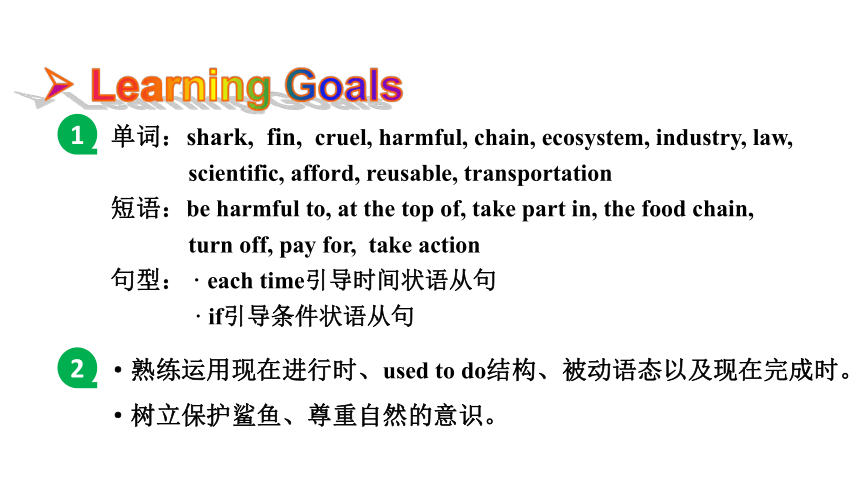
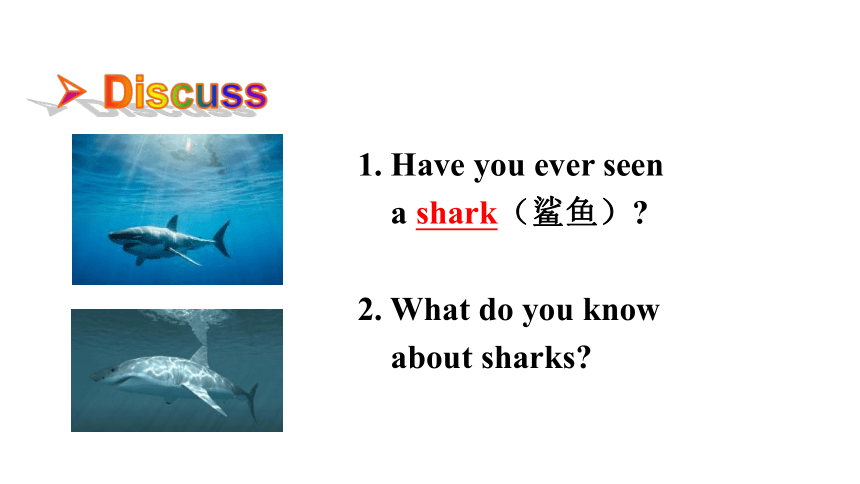
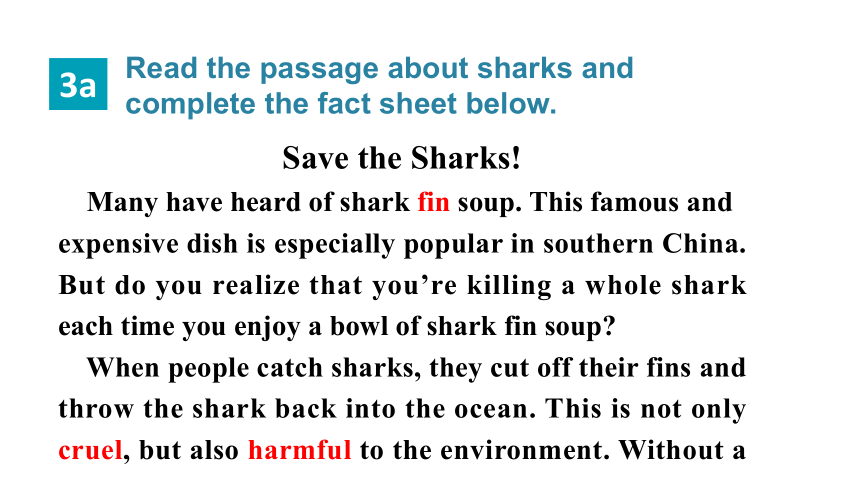
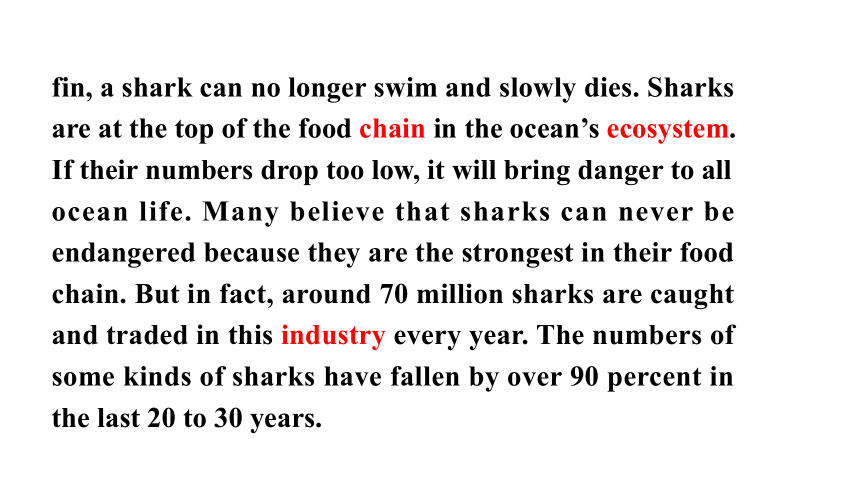
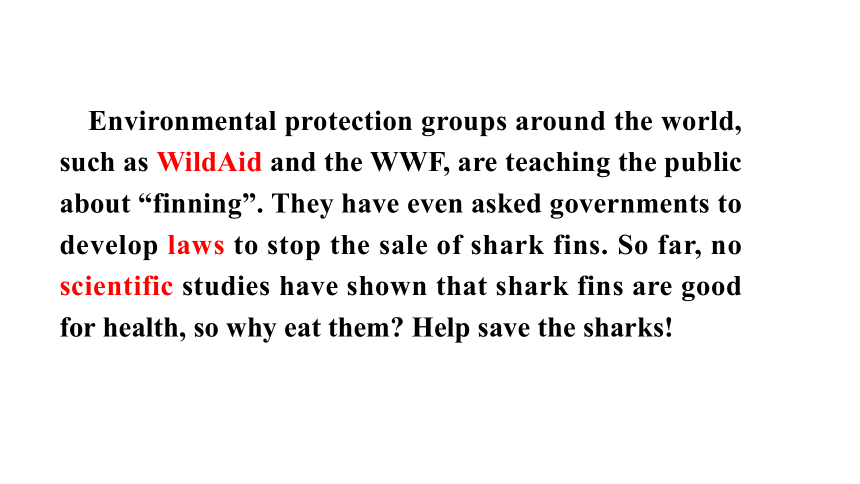
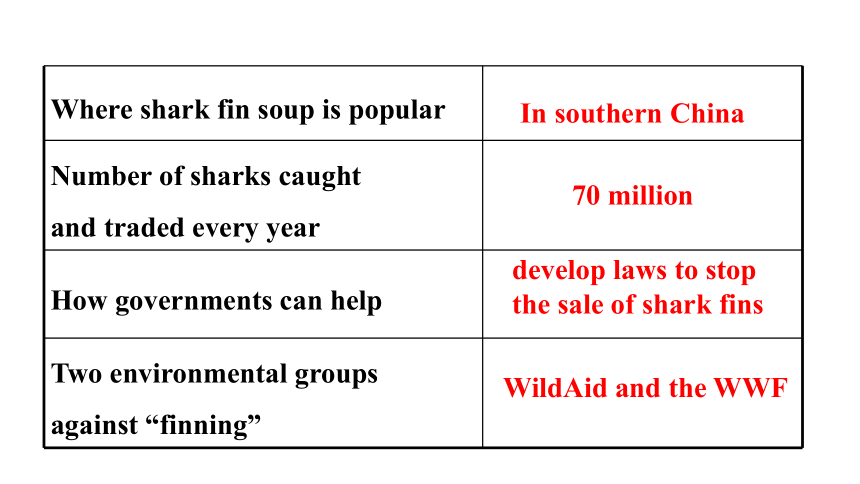
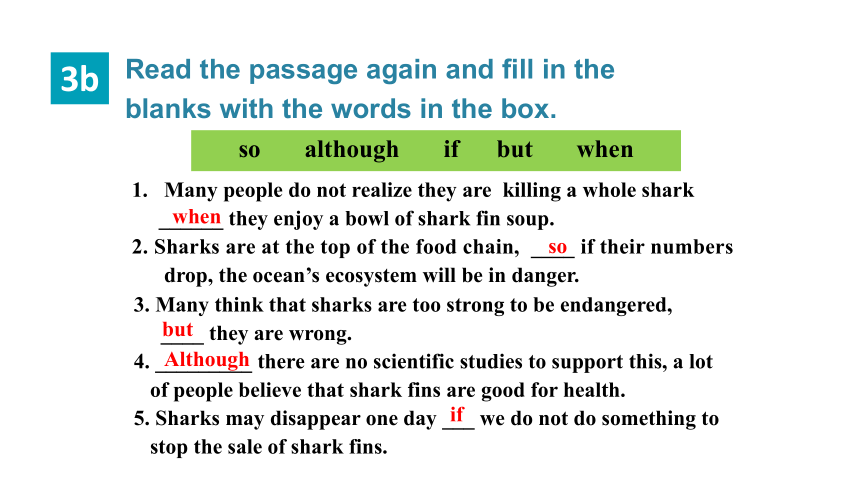

文档简介
(共28张PPT)
Section
第 2 课 时 (3a~4c)
…………………………………
A
Unit 8 We’re trying to save the earth!
单词:shark, fin, cruel, harmful, chain, ecosystem, industry, law,
scientific, afford, reusable, transportation
短语:be harmful to, at the top of, take part in, the food chain,
turn off, pay for, take action
句型: · each time引导时间状语从句
· if引导条件状语从句
Learning Goals
·熟练运用现在进行时、used to do结构、被动语态以及现在完成时。
·树立保护鲨鱼、尊重自然的意识。
1
2
Discuss
1. Have you ever seen
a shark(鲨鱼)
2. What do you know
about sharks
Read the passage about sharks and complete the fact sheet below.
3a
Save the Sharks!
Many have heard of shark fin soup. This famous and
expensive dish is especially popular in southern China. But do you realize that you’re killing a whole shark each time you enjoy a bowl of shark fin soup
When people catch sharks, they cut off their fins and throw the shark back into the ocean. This is not only cruel, but also harmful to the environment. Without a
fin, a shark can no longer swim and slowly dies. Sharks are at the top of the food chain in the ocean’s ecosystem. If their numbers drop too low, it will bring danger to all ocean life. Many believe that sharks can never be endangered because they are the strongest in their food chain. But in fact, around 70 million sharks are caught and traded in this industry every year. The numbers of some kinds of sharks have fallen by over 90 percent in the last 20 to 30 years.
Environmental protection groups around the world, such as WildAid and the WWF, are teaching the public about “finning”. They have even asked governments to develop laws to stop the sale of shark fins. So far, no scientific studies have shown that shark fins are good for health, so why eat them Help save the sharks!
Where shark fin soup is popular
Number of sharks caught and traded every year
How governments can help
Two environmental groups against “finning”
70 million
develop laws to stop the sale of shark fins
WildAid and the WWF
In southern China
Read the passage again and fill in the blanks with the words in the box.
so although if but when
Many people do not realize they are killing a whole shark
______ they enjoy a bowl of shark fin soup.
2. Sharks are at the top of the food chain, ____ if their numbers drop, the ocean’s ecosystem will be in danger.
when
so
3. Many think that sharks are too strong to be endangered,
____ they are wrong.
4. _________ there are no scientific studies to support this, a lot
of people believe that shark fins are good for health.
5. Sharks may disappear one day ___ we do not do something to
stop the sale of shark fins.
but
Although
if
3b
Language points
Many have heard of shark fin soup.
许多人听说过鱼翅汤。
hear of意为“听说”,与hear about 同义。强调从别
人那里间接听到,后接名词、代词作宾语,不可以用
于进行时态。
※ Mr. Smith, have you ever heard of this matter?
史密斯先生,你以前听说过这件事吗?
2. When people catch sharks, they cut off their fins
and throw the shark back into the ocean.
当人们抓住鲨鱼的时候,他们切掉它们的鳍,然后把鲨
鱼扔回海里。
cut off是固定搭配,意为“切除;切掉”。
※ Take care not to cut off the buds.
当心不要把幼芽切掉。
3. This is not only cruel, but also harmful to the
environment. 这样不仅残忍,也对环境有害。
cruel作形容词,意为“残酷的;残忍的”。
※ How could he be so cruel?他怎么能这样残酷无情呢?
harmful作形容词,意为“有害的”,常用于固定搭配be
harmful to,意为“对……有害”,等同于do harm to、be
bad for。
※ It is harmful to the stomach to eat cold food.
吃冷食对胃不好。
4. So far, no scientific studies have shown that
shark fins are good for health, so why eat them?
到目前为止,没有科学研究表明鱼翅对健康有好处,所
以为什么要吃它们呢?
so far意为“到目前为止;迄今为止”,是现在完成时的标志之一。
※ So far we haven’t found out an effective way to cure
AIDS.
迄今为止我们还没有找到治疗艾滋病的有效办法。
We’re trying to save the earth. Present progressive
The river used to be so clean. used to
The air is badly polluted. Passive voice
No scientific studies have shown that shark fins are good for health. Present perfect
We should help save the sharks. Modal verbs
Grammar Focus
现在进行时的构成为:
“am/is/are+动词的现在分词”。
1. 表示说话时正在进行的动作。
※ I am doing my homework. 我正在做家庭作业。
2. 表示现阶段正在进行的动作。
※ He is writing a novel these days.
这些天他正在写一本小说。
Grammer points
现在进行时
“used to+动词原形”表示过去存在的某种状态或过去某种经常性、习惯性的行为或动作,这种情况目前已不复存在,侧重于过去与现在的对比。
※ I used to be shy at school, but now I am very outgoing.
我过去上学时很害羞,但是现在我十分外向。
used to的用法
被动语态的构成为:“be动词+及物动词的过去分词”。
1. 表示不知道或没有必要说明动作的执行者是谁。
※ This book is written for children. 这本书是为儿童写的。
2. 表示动作的承受者是谈话的中心。
※ My sweater is made by my mother.
我的毛衣是我妈妈做的。
3. 表示出于礼貌等方面的考虑并不说出动作的执行者是谁。
※ He was asked to leave. 他被要求离开。
被动语态
现在完成时的构成为:“have/has+动词的过去分词”。
1. 强调不久前完成的动作对现在产生的影响。
※ I have seen the film already. 我已经看过那部电影了。
2. 表示从过去某时开始并一直延续至今的动作或状态,
这个动作或状态也许还会持续下去。
※ He has lived here since then.
从那以来,他一直住在这里。
现在完成时
Fill in the blanks with the correct forms of the verbs in brackets.
Joe: _____ you ever ______ (take) part
in an environmental project
Ken: Yes, I have. I ______ (help) with
a Clean-Up Day last year. It was
__________(consider)the biggest
clean-up project this city ____
ever ____ (have).
Have
taken
helped
considered
had
had
参加,多指参加群众性活动
4a
Joe: How many people ____ (take) part
Ken: I _____ (think) more than 1,000
people ______ (come) to help out.
Joe: That’s fantastic! I guess everyone in
this city is ______ (try) to improve
the environment.
Ken: Yes, we can’t afford to ____ (wait)
any longer to take action!
took
think
came
trying
wait
afford及物动词,意为“负担得起”。afford to do sth. 承担得起做某事。
采取行动
Language points
Yes, we can’t afford to wait any longer to take action!是的,我们不能再等了,(应该立刻)采取行动!
afford通常与can、be able to等连用,表示“负担得起
(费用、后果等);抽得出(时间)”。其后一般接名词、
代词或不定式,主要用于否定句中。
※ We can’t afford to pay such a price.
我们付不起这个价钱。
Fill in the blanks with the appropriate modal verbs from the box.
can would could have to should must may/might
People __________ think that big things ___________
be done to save the earth. Many forget that saving the
earth begins with small things.
may/might
must/have to
4b
For example, you ____________________
save electricity by turning off the lights when you leave a room. You ________________ also use reusable bags instead of plastic bags.
can/ could/ should
could/ can/ should
关闭
可重复使用的
can would could have to should must may/might
I think it’s a great idea that you now _______ pay for plastic bags in some stores. And instead of driving to school or work, you ________________ ride your bike or walk. If it’s far, you _________ take the bus.
have to
can/should/could
can/could
支付
can would could have to should must may/might
All these small things __________ add up and
become big things that _______________ improve
the environment. Let’s take action now!
can/ could
would/can/could
can would could have to should must may/might
Make a list of things that people can do to help the environment and discuss your list with your partner.
I think that everyone should use public transportation.
I disagree. It’s difficult for parents with young children to use public transportation…
4c
I. 根据句意及汉语提示,写出单词。
1. Why not make ________(法律) to stop smoking in public places
2. So far, China’s ________(工业) has developed quickly.
laws
industry
Practice
3. Can you invite Mr. Jason to speak at the _________
(科学的) meeting
4. Don’t be so ______(残酷的) to the children.
scientific
cruel
II.翻译句子。
1. 她过去常常周末和同学闲逛。
She used to hang out with his classmates on weekends.
2. 他习惯于每天晚上熬夜。
He is used to staying up every night.
3. 刚才一些老年人参观了我们学校。(被动语态)
Our school was visited by some old people just now.
4. 这个工厂的工人生产不同种类的机器。(被动语态)
5. 我们不能在教室里吃东西。
6. 首先我们必须完成家庭作业。
7. 现在我正在练习骑自行车。
Different kinds of machines are produced by the workers in the factory.
We can’t eat in the classroom.
We must finish our homework first.
Now, I am practising riding bikes.
Section
第 2 课 时 (3a~4c)
…………………………………
A
Unit 8 We’re trying to save the earth!
单词:shark, fin, cruel, harmful, chain, ecosystem, industry, law,
scientific, afford, reusable, transportation
短语:be harmful to, at the top of, take part in, the food chain,
turn off, pay for, take action
句型: · each time引导时间状语从句
· if引导条件状语从句
Learning Goals
·熟练运用现在进行时、used to do结构、被动语态以及现在完成时。
·树立保护鲨鱼、尊重自然的意识。
1
2
Discuss
1. Have you ever seen
a shark(鲨鱼)
2. What do you know
about sharks
Read the passage about sharks and complete the fact sheet below.
3a
Save the Sharks!
Many have heard of shark fin soup. This famous and
expensive dish is especially popular in southern China. But do you realize that you’re killing a whole shark each time you enjoy a bowl of shark fin soup
When people catch sharks, they cut off their fins and throw the shark back into the ocean. This is not only cruel, but also harmful to the environment. Without a
fin, a shark can no longer swim and slowly dies. Sharks are at the top of the food chain in the ocean’s ecosystem. If their numbers drop too low, it will bring danger to all ocean life. Many believe that sharks can never be endangered because they are the strongest in their food chain. But in fact, around 70 million sharks are caught and traded in this industry every year. The numbers of some kinds of sharks have fallen by over 90 percent in the last 20 to 30 years.
Environmental protection groups around the world, such as WildAid and the WWF, are teaching the public about “finning”. They have even asked governments to develop laws to stop the sale of shark fins. So far, no scientific studies have shown that shark fins are good for health, so why eat them Help save the sharks!
Where shark fin soup is popular
Number of sharks caught and traded every year
How governments can help
Two environmental groups against “finning”
70 million
develop laws to stop the sale of shark fins
WildAid and the WWF
In southern China
Read the passage again and fill in the blanks with the words in the box.
so although if but when
Many people do not realize they are killing a whole shark
______ they enjoy a bowl of shark fin soup.
2. Sharks are at the top of the food chain, ____ if their numbers drop, the ocean’s ecosystem will be in danger.
when
so
3. Many think that sharks are too strong to be endangered,
____ they are wrong.
4. _________ there are no scientific studies to support this, a lot
of people believe that shark fins are good for health.
5. Sharks may disappear one day ___ we do not do something to
stop the sale of shark fins.
but
Although
if
3b
Language points
Many have heard of shark fin soup.
许多人听说过鱼翅汤。
hear of意为“听说”,与hear about 同义。强调从别
人那里间接听到,后接名词、代词作宾语,不可以用
于进行时态。
※ Mr. Smith, have you ever heard of this matter?
史密斯先生,你以前听说过这件事吗?
2. When people catch sharks, they cut off their fins
and throw the shark back into the ocean.
当人们抓住鲨鱼的时候,他们切掉它们的鳍,然后把鲨
鱼扔回海里。
cut off是固定搭配,意为“切除;切掉”。
※ Take care not to cut off the buds.
当心不要把幼芽切掉。
3. This is not only cruel, but also harmful to the
environment. 这样不仅残忍,也对环境有害。
cruel作形容词,意为“残酷的;残忍的”。
※ How could he be so cruel?他怎么能这样残酷无情呢?
harmful作形容词,意为“有害的”,常用于固定搭配be
harmful to,意为“对……有害”,等同于do harm to、be
bad for。
※ It is harmful to the stomach to eat cold food.
吃冷食对胃不好。
4. So far, no scientific studies have shown that
shark fins are good for health, so why eat them?
到目前为止,没有科学研究表明鱼翅对健康有好处,所
以为什么要吃它们呢?
so far意为“到目前为止;迄今为止”,是现在完成时的标志之一。
※ So far we haven’t found out an effective way to cure
AIDS.
迄今为止我们还没有找到治疗艾滋病的有效办法。
We’re trying to save the earth. Present progressive
The river used to be so clean. used to
The air is badly polluted. Passive voice
No scientific studies have shown that shark fins are good for health. Present perfect
We should help save the sharks. Modal verbs
Grammar Focus
现在进行时的构成为:
“am/is/are+动词的现在分词”。
1. 表示说话时正在进行的动作。
※ I am doing my homework. 我正在做家庭作业。
2. 表示现阶段正在进行的动作。
※ He is writing a novel these days.
这些天他正在写一本小说。
Grammer points
现在进行时
“used to+动词原形”表示过去存在的某种状态或过去某种经常性、习惯性的行为或动作,这种情况目前已不复存在,侧重于过去与现在的对比。
※ I used to be shy at school, but now I am very outgoing.
我过去上学时很害羞,但是现在我十分外向。
used to的用法
被动语态的构成为:“be动词+及物动词的过去分词”。
1. 表示不知道或没有必要说明动作的执行者是谁。
※ This book is written for children. 这本书是为儿童写的。
2. 表示动作的承受者是谈话的中心。
※ My sweater is made by my mother.
我的毛衣是我妈妈做的。
3. 表示出于礼貌等方面的考虑并不说出动作的执行者是谁。
※ He was asked to leave. 他被要求离开。
被动语态
现在完成时的构成为:“have/has+动词的过去分词”。
1. 强调不久前完成的动作对现在产生的影响。
※ I have seen the film already. 我已经看过那部电影了。
2. 表示从过去某时开始并一直延续至今的动作或状态,
这个动作或状态也许还会持续下去。
※ He has lived here since then.
从那以来,他一直住在这里。
现在完成时
Fill in the blanks with the correct forms of the verbs in brackets.
Joe: _____ you ever ______ (take) part
in an environmental project
Ken: Yes, I have. I ______ (help) with
a Clean-Up Day last year. It was
__________(consider)the biggest
clean-up project this city ____
ever ____ (have).
Have
taken
helped
considered
had
had
参加,多指参加群众性活动
4a
Joe: How many people ____ (take) part
Ken: I _____ (think) more than 1,000
people ______ (come) to help out.
Joe: That’s fantastic! I guess everyone in
this city is ______ (try) to improve
the environment.
Ken: Yes, we can’t afford to ____ (wait)
any longer to take action!
took
think
came
trying
wait
afford及物动词,意为“负担得起”。afford to do sth. 承担得起做某事。
采取行动
Language points
Yes, we can’t afford to wait any longer to take action!是的,我们不能再等了,(应该立刻)采取行动!
afford通常与can、be able to等连用,表示“负担得起
(费用、后果等);抽得出(时间)”。其后一般接名词、
代词或不定式,主要用于否定句中。
※ We can’t afford to pay such a price.
我们付不起这个价钱。
Fill in the blanks with the appropriate modal verbs from the box.
can would could have to should must may/might
People __________ think that big things ___________
be done to save the earth. Many forget that saving the
earth begins with small things.
may/might
must/have to
4b
For example, you ____________________
save electricity by turning off the lights when you leave a room. You ________________ also use reusable bags instead of plastic bags.
can/ could/ should
could/ can/ should
关闭
可重复使用的
can would could have to should must may/might
I think it’s a great idea that you now _______ pay for plastic bags in some stores. And instead of driving to school or work, you ________________ ride your bike or walk. If it’s far, you _________ take the bus.
have to
can/should/could
can/could
支付
can would could have to should must may/might
All these small things __________ add up and
become big things that _______________ improve
the environment. Let’s take action now!
can/ could
would/can/could
can would could have to should must may/might
Make a list of things that people can do to help the environment and discuss your list with your partner.
I think that everyone should use public transportation.
I disagree. It’s difficult for parents with young children to use public transportation…
4c
I. 根据句意及汉语提示,写出单词。
1. Why not make ________(法律) to stop smoking in public places
2. So far, China’s ________(工业) has developed quickly.
laws
industry
Practice
3. Can you invite Mr. Jason to speak at the _________
(科学的) meeting
4. Don’t be so ______(残酷的) to the children.
scientific
cruel
II.翻译句子。
1. 她过去常常周末和同学闲逛。
She used to hang out with his classmates on weekends.
2. 他习惯于每天晚上熬夜。
He is used to staying up every night.
3. 刚才一些老年人参观了我们学校。(被动语态)
Our school was visited by some old people just now.
4. 这个工厂的工人生产不同种类的机器。(被动语态)
5. 我们不能在教室里吃东西。
6. 首先我们必须完成家庭作业。
7. 现在我正在练习骑自行车。
Different kinds of machines are produced by the workers in the factory.
We can’t eat in the classroom.
We must finish our homework first.
Now, I am practising riding bikes.
同课章节目录
- Unit 1 When was it invented?
- Section A
- Section B
- Unit 2 Teenagers should be allowed to choose their
- Section A
- Section B
- Unit 3 It must belong to Carla.
- Section A
- Section B
- Unit 4 I like music that I can dance to.
- Section A
- Section B
- Unit 5 You’re supposed to shake hands.
- Section A
- Section B
- Unit 6 Sad movies make me cry.
- Section A
- Section B
- Unit 7 Life is full of the unexpected.
- Section A
- Section B
- Unit 8 We're trying to save the earth!
- Section A
- Section B
- Unit 9 It's important to have good habits.
- Section A
- Section B
- Unit 10 I remember meeting all of you in Grade 6.
- Section A
- Section B
